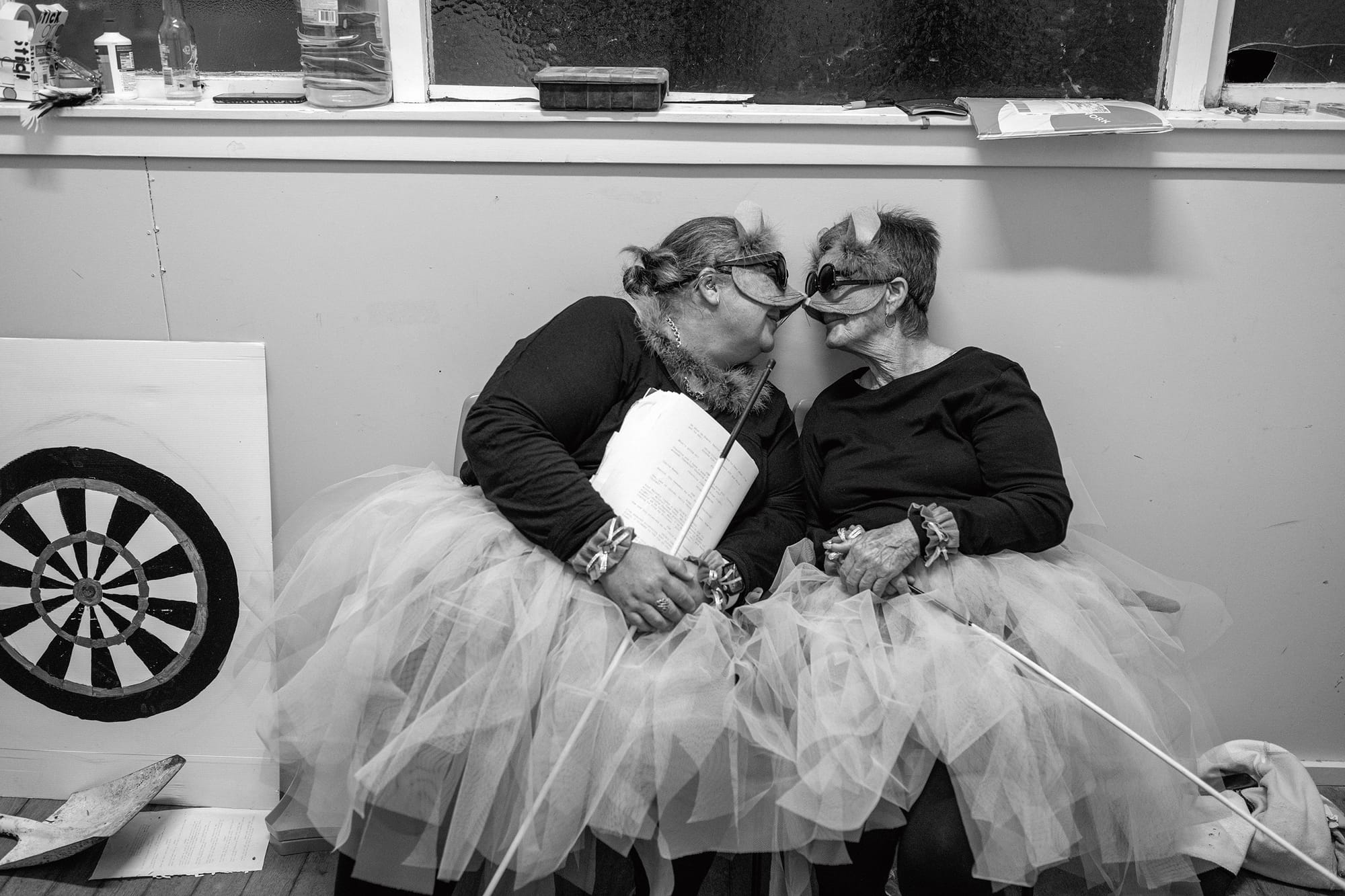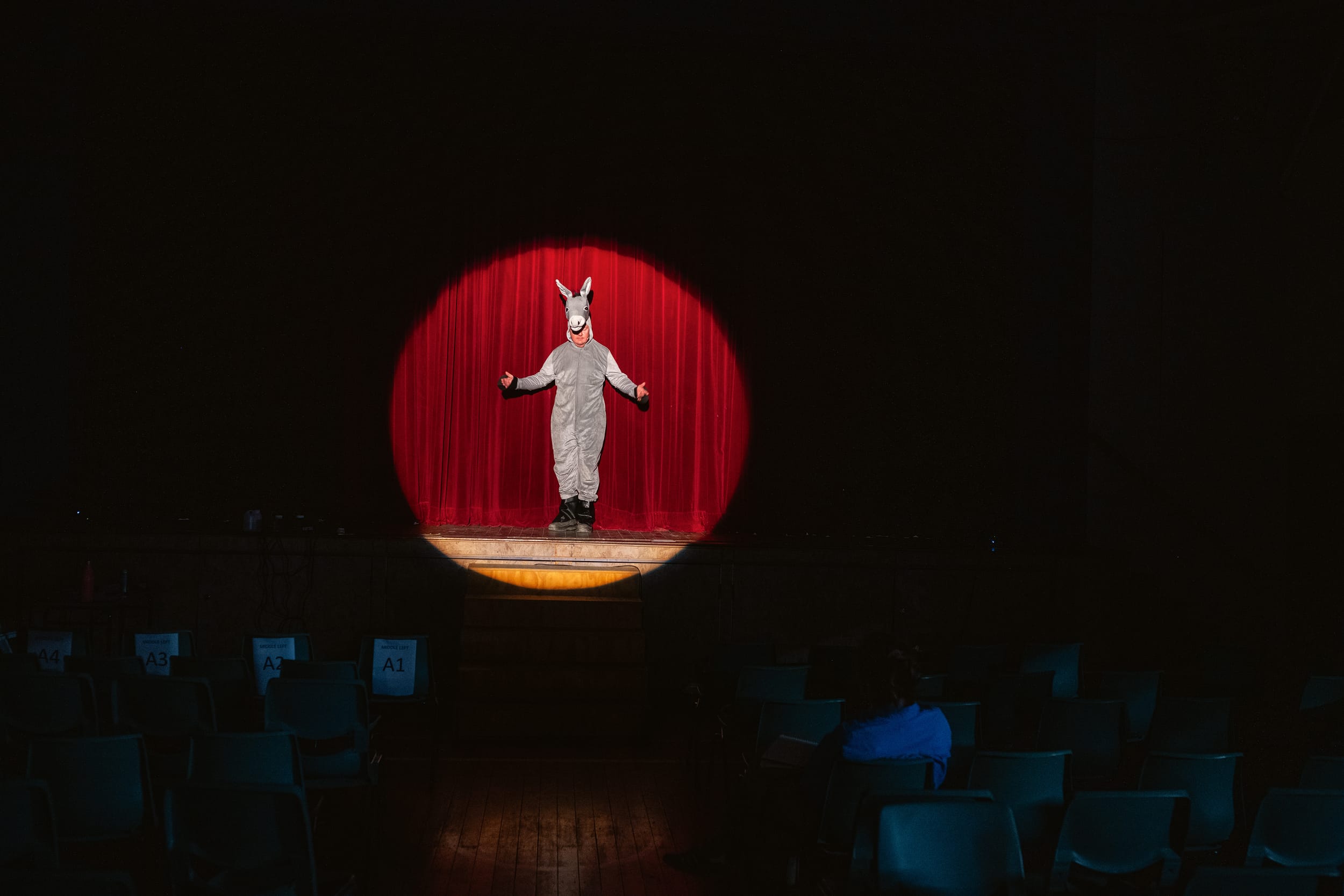
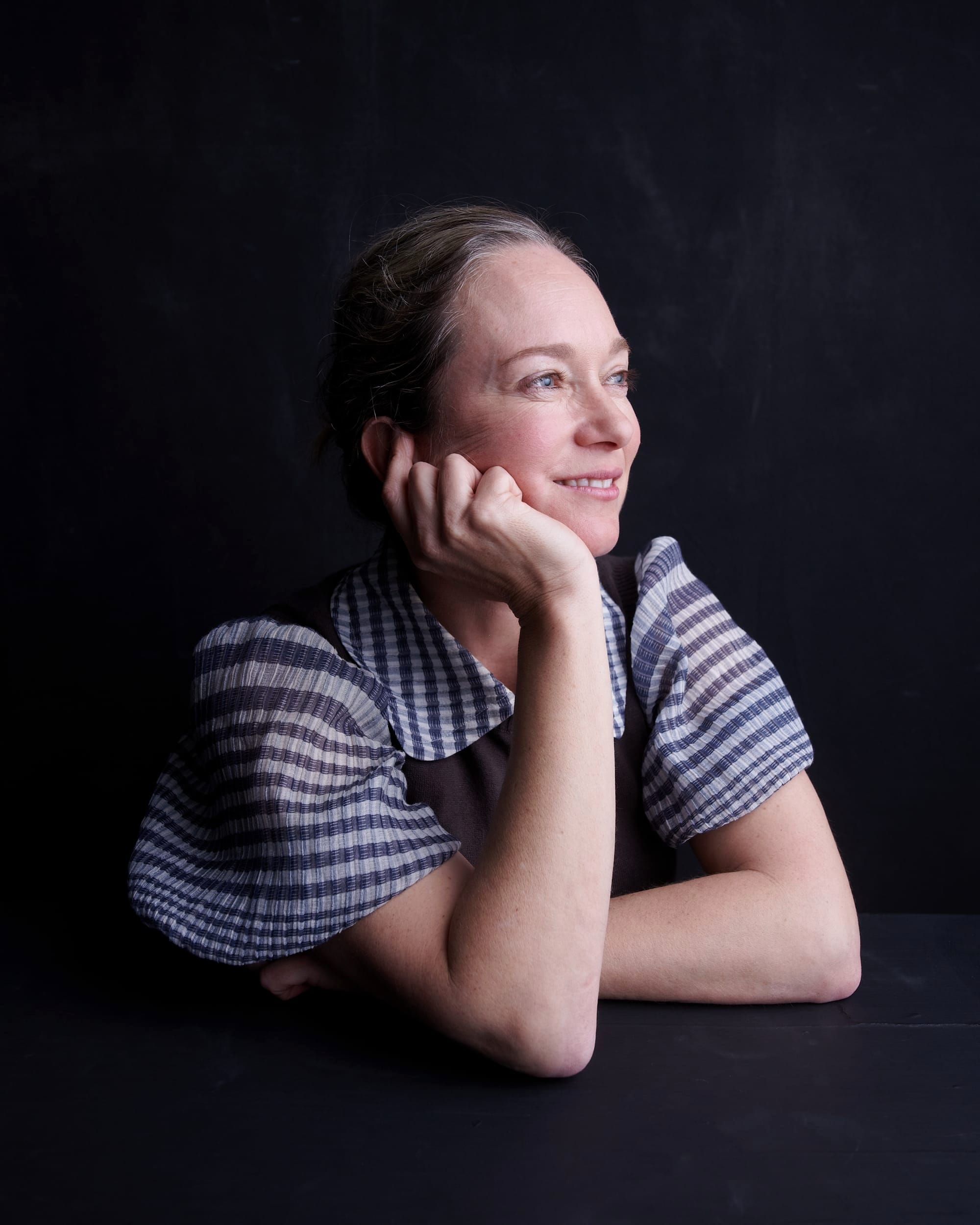
How an amateur musical changed a small town. Words by Annabelle Hickson. Photography by Hugh Stewart.
TONIGHT is the final dress rehearsal for a musical adaptation of Shrek in the small farming town of Mungindi on the NSW-Queensland border. This weekend, the 40-strong cast of farmers, teachers, nurses, crop-dusters, postmistresses, ambos and agronomists will perform two sold-out shows in the town hall in front of their friends, family and community. Only some of them can sing. But being able to sing is not the point.
Anyone who wanted to be part of this musical got a role. If there wasn’t a suitable part, Emily Harris, the writer and director who moved to Mungindi about 25 years ago when she married a local farmer, wrote a part for them. They play well-known characters such as Shrek and Princess Fiona, and new bespoke additions such as the Three Little Pigs.
The youngest cast member is 19. The oldest is 68. The Three Blind Mice are played by three generations of one family. There are extroverts like the fairy godmother, played with panache by a young agronomist in drag, and Snow White, played by a young South African woman of short stature. Others are more introverted, like the crop-dusting pilot who stays back of house as the stage manager and the two young ambos up in the sound and lighting box. Some are juggling a lot of stuff outside the musical, like the 30-year-old high school teacher and youth pastor who, on top of her two jobs, has become a guardian to a local teenage girl.
Whether introverted or extroverted, everyone who came together to perform this wonderfully bizarre version of Shrek – Shrek and the Duloc Idol – has worked hard. For six months the cast and crew have been practising for four hours, twice a week. Harris, the director, also played the role of team coach, keeping everyone motivated to turn up with “finding your why” speeches and “summiting Everest” analogies. (“If my kids were here and could hear me talking like this, they would have died,” she says, laughing.)

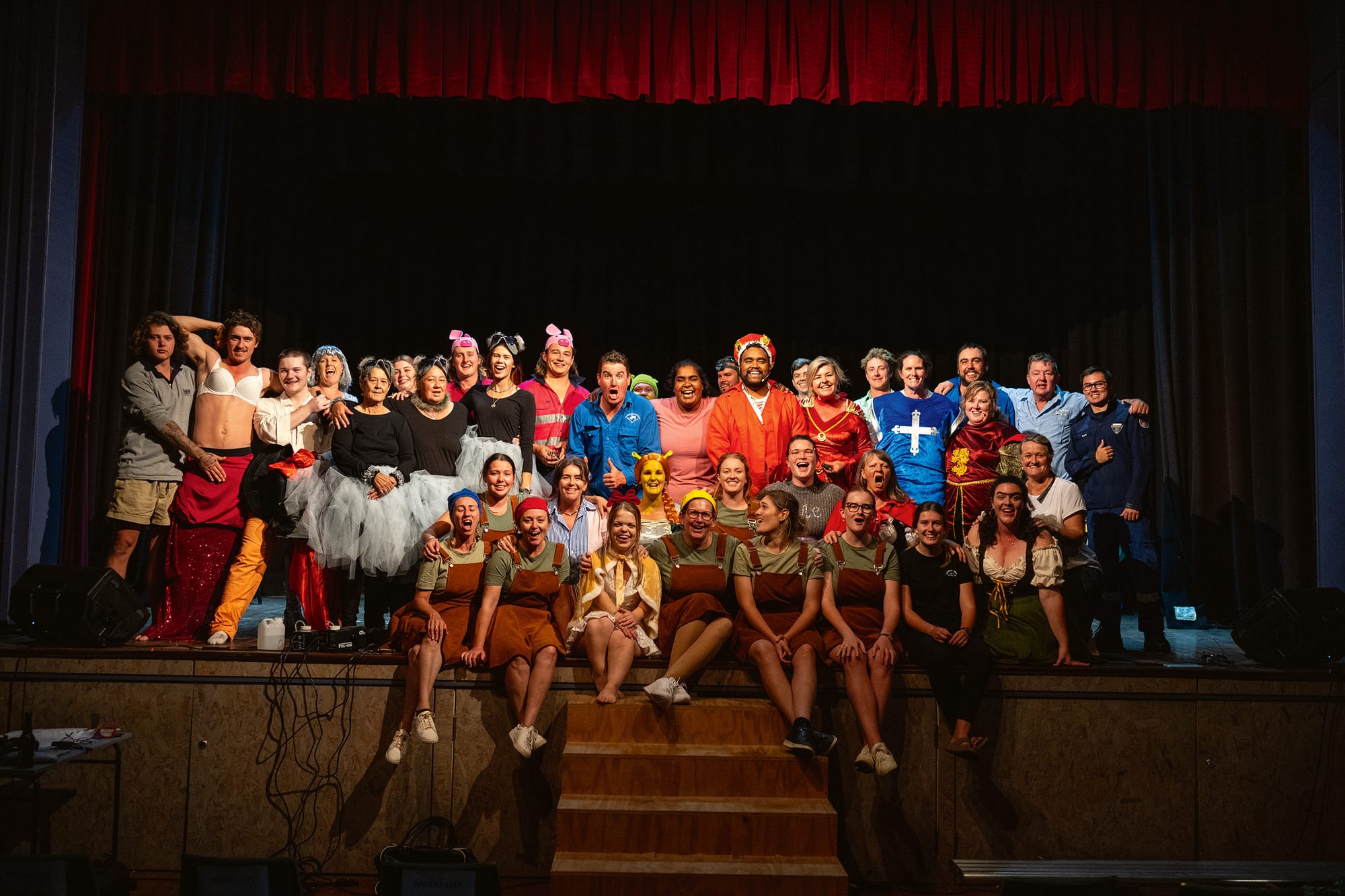
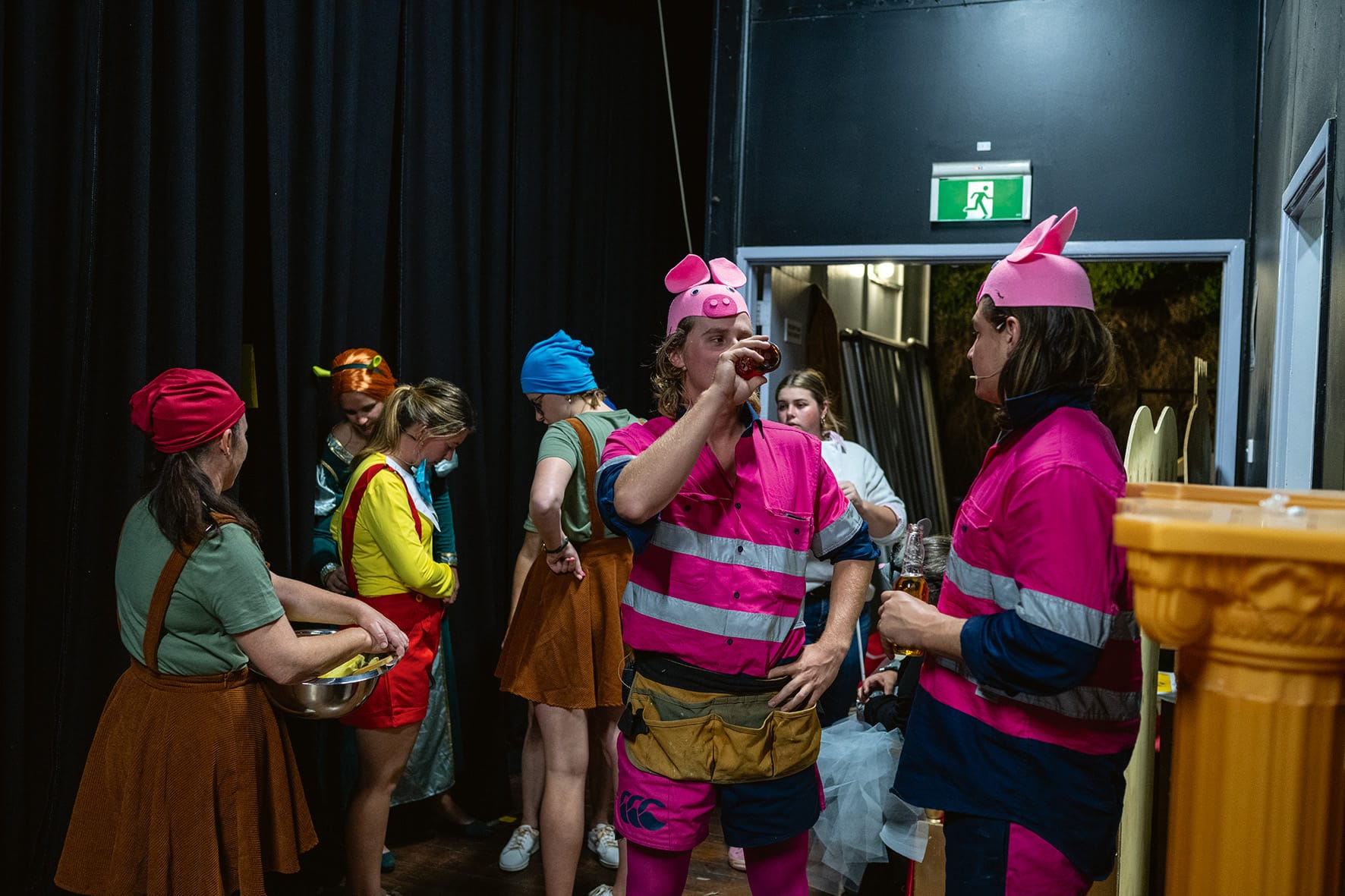
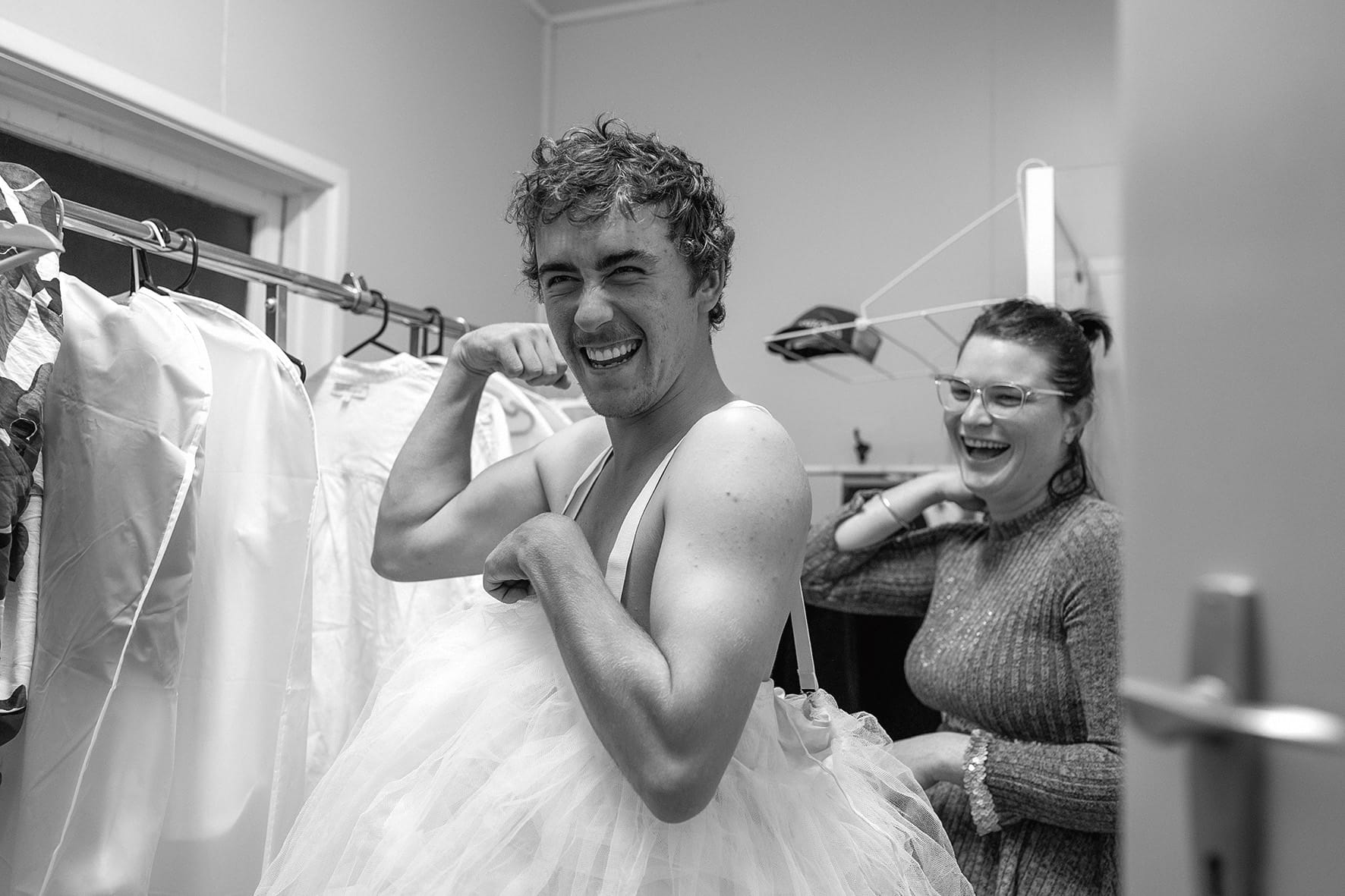
(Top) Musical director and resident Emily Harris watches the last dress rehearsal from the stalls. “I want to live somewhere where we can all get together and work towards a common goal,” she says. (Bottom) Behind the scenes with two of the Three Little Pigs (left) and Fairy Godmother Eddie McDonnell with Sarah Ziebarth. Photography by Hugh Stewart.
There are lots of good reasons why a commitment such as this would be too much, even for Harris. She has a big family to look after. She and her husband run a large agribusiness. She’s working on a novel. So why is she doing it?
“I want to live in a town that has things like this,” she says. “I want to live somewhere where we all get together and work towards a common goal, not just individual things. I mean, look at us,” she pauses. “We’re fat, we’re thin, we’re rich, we’re poor, we’re black, we’re white, we’re short, we’re tall, some of us can sing, some can’t and look at what we’re doing, all together.” In Mungindi (pronounced mung-in-die), multi-millionaires live alongside others who have very little. Economic inequality in the small town is plain to see. “But you can find a commonality,” says Harris. “I mean, we’re all people. We all breathe in and we breathe out. And with the musical, that commonality is laughter.”
Harris is not alone in seeing the value of commonality. One of the great American political thinkers of the 19th century and the co-designer of New York’s Central Park, Frederick Law Olmsted, believed small associations such as community theatre groups played a crucial role in making democracy work. The “commonplace civilisation” of a liberal society depended on these groups, he believed, not because of the end result but because of the trust and relationships built along the way. He didn’t use the term “social capital” as modern political scientists and corporate marketing departments do, but he meant the same thing. Networks of relationships between people who live and work together enable society to function effectively. In his day, building a park was a way to provide a space for and encourage commonplace civilisation and set a stage for social capital to grow.
In 1993, political scientist Robert Putnam published a famous study that supported Olmsted’s insight with quantifiable, empirical data collected over 20 years. The central finding of Putnam’s study of democratic institutions in Italy was that the performance of governments is closely related to the vibrancy of associational life in each region. The more citizens actively participated in sports clubs, book clubs, choirs, service groups and choral societies, the more
regional governments were “efficient in their internal operation, creative in their policy initiatives and effective in implementing those initiatives”. His study found that social capital plays a vital role in how communities function and has significant implications for economic development, political participation and overall social well-being.
“What makes democracy work,” wrote journalist Adam Gopnik in The New Yorker of Putnam’s study, “is the presence of what, in sociologese, is called ‘horizontal’ leisure groups. Choral groups” – or in our case, Shrek musicals – “make good government” and “protect from tyranny”.
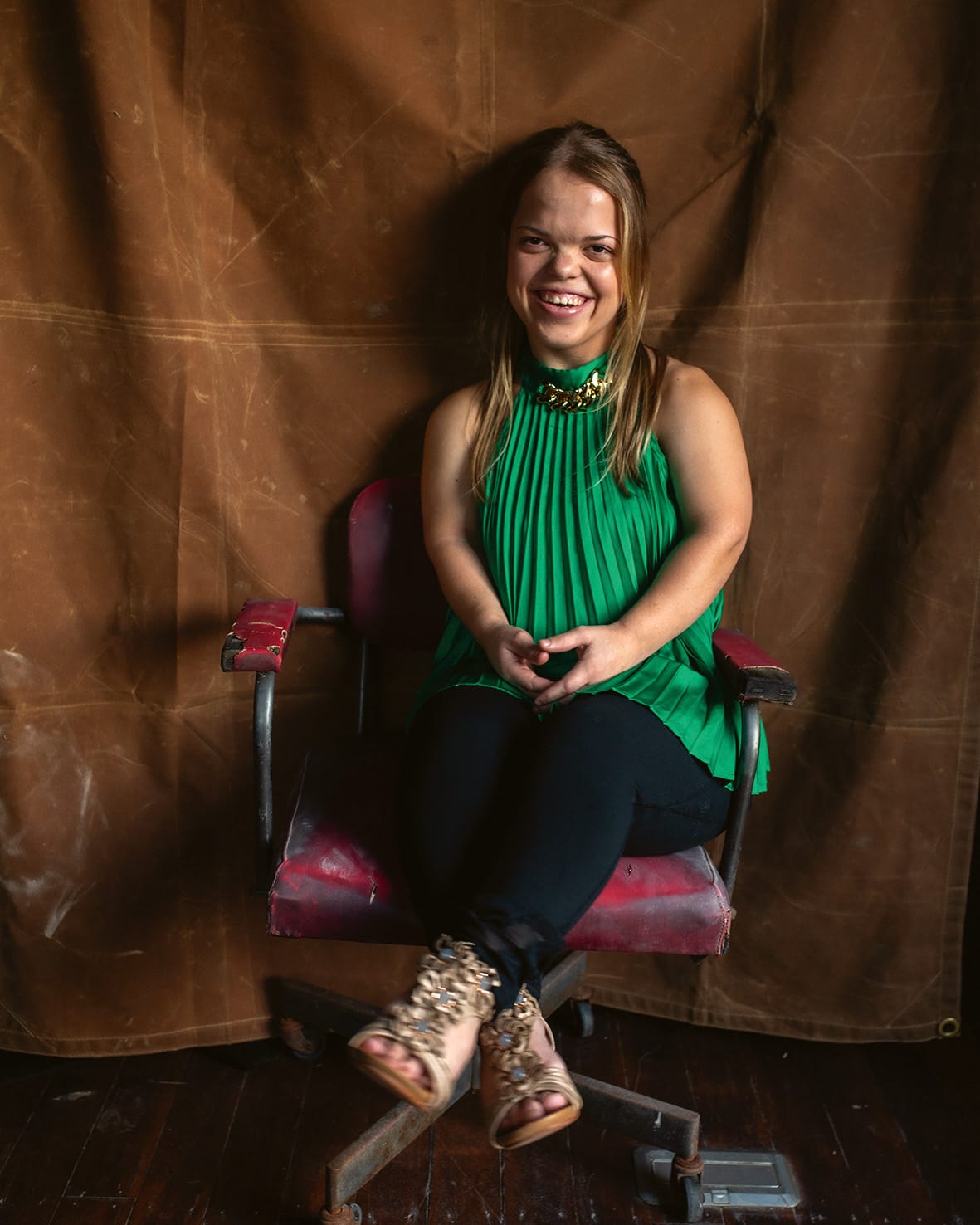
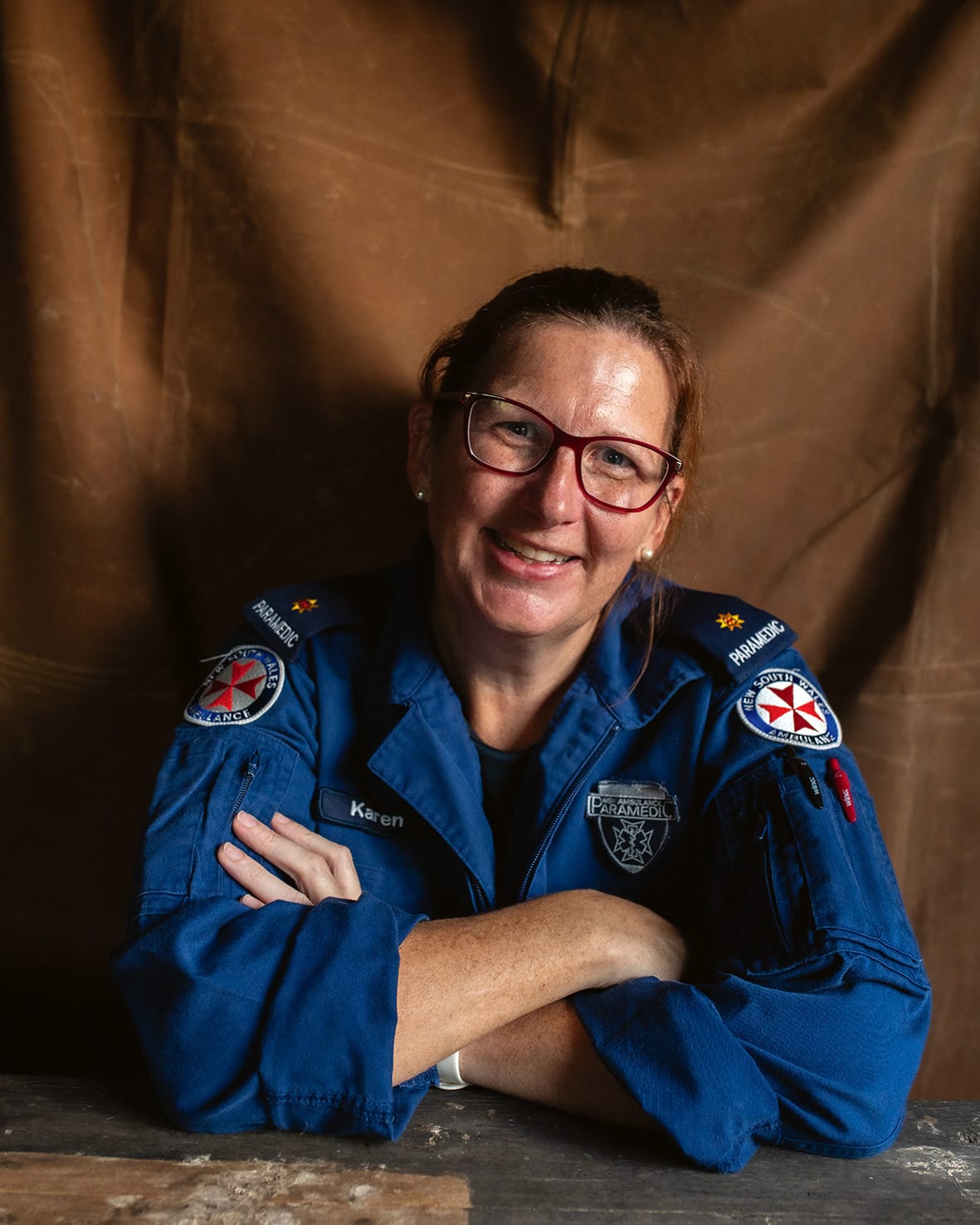




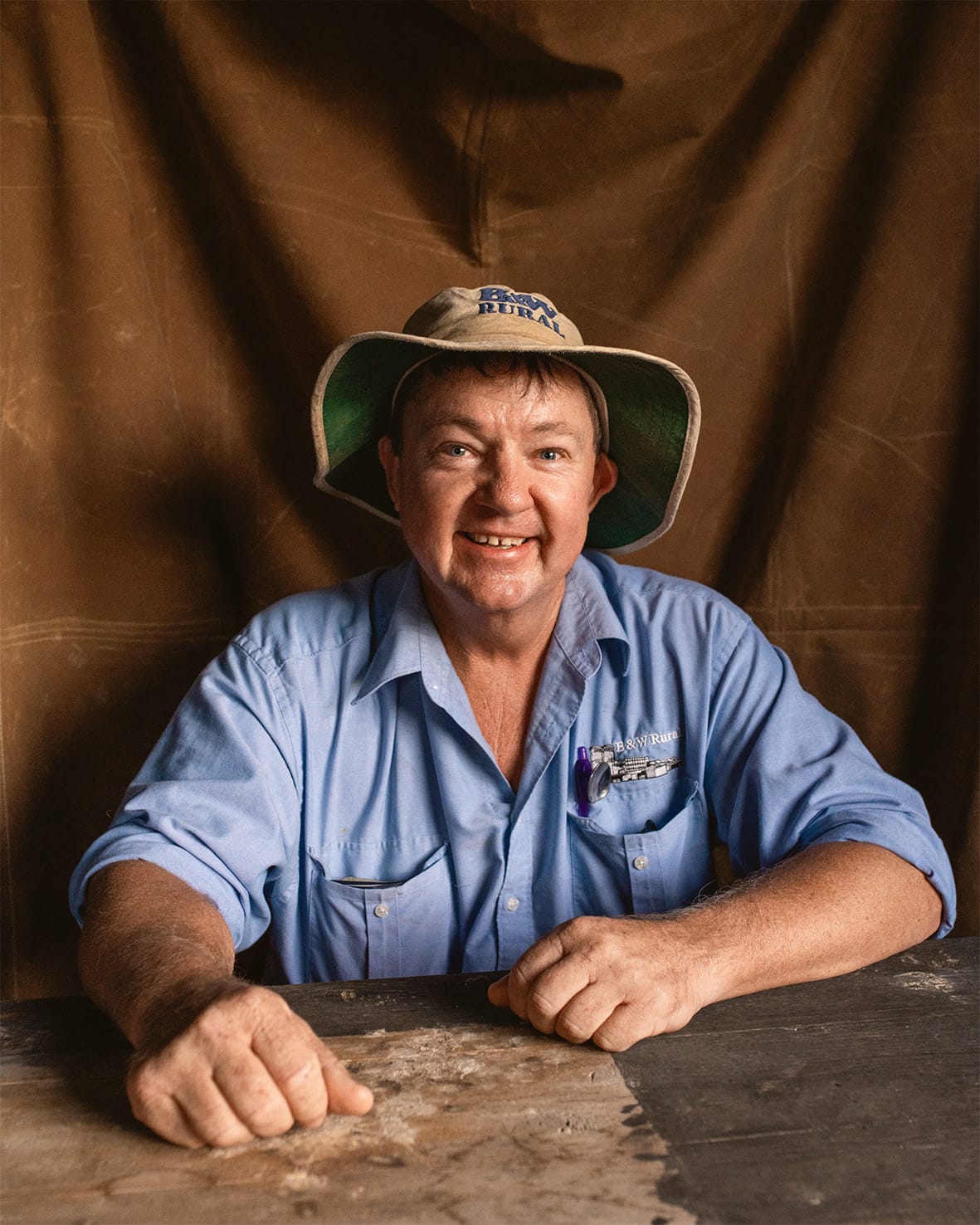
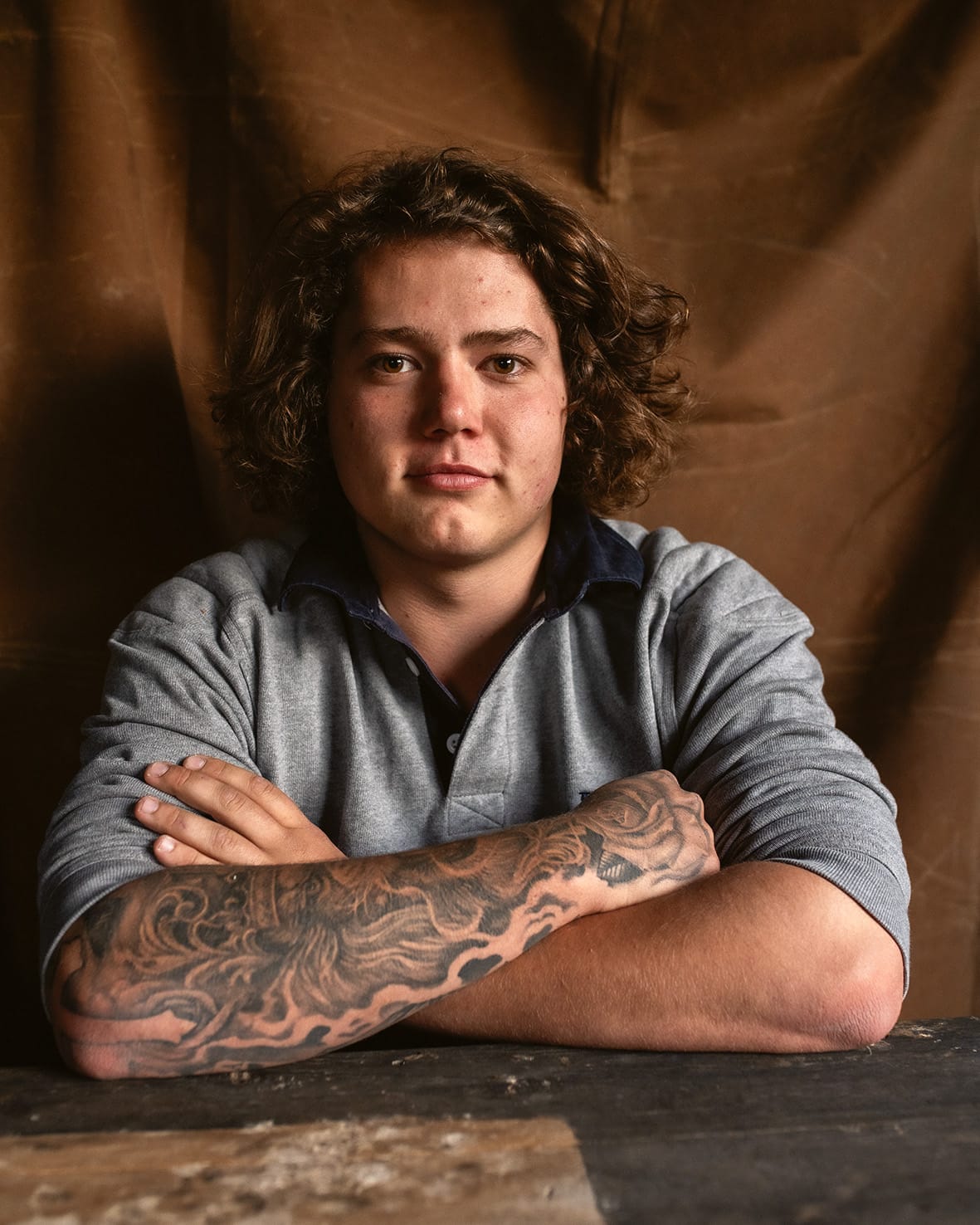

Nine of the 40-strong Shrek cast, made up of farmers, teachers, nurses, crop-dusters, postmistresses, ambos and agronomists. Only some of them can sing. Photography by Hugh Stewart.
Mungindi is a town of contrasts. Some of Australia’s richest farmers live and work on the black soils surrounding the town, growing wheat in the winter and cotton in the summer. Children are sent to private boarding schools. International ski holidays are booked. When it’s dry, it’s tough, but when it rains, business booms.
There’s another side to the demographics, too. According to the official 2021 statistics, on the scale of relative socio-economic disadvantage across Australia – where one indicates the greatest disadvantage and 10 indicates the least – Mungindi scores one. About a third of Mungindi households earn less than $650 a week, compared with 16 per cent Australia-wide. About a third of people in Mungindi finished their education at year 10 or earlier. Mungindi is part of the Moree Plains local government area, which ranks the highest or second highest in NSW for domestic violence, assault, robbery, break-and-enter, car theft, stealing and malicious damage to property.
On paper, Mungindi has plenty of reasons to have plenty of problems. Yet the local police and ambulance officers say that crime and drugs are much less of a relative problem in Mungindi than in Moree, the biggest town in the LGA, 90 minutes’ drive south-east. There is a huge spread in the socio-demographics of Mungindi, but there is cohesion.
Anna Harrison runs a farming contracting business with her husband and plays the character of Mirror, Mirror on the Wall in the musical with sequined aplomb. She has lived in the main street of Mungindi for 11 years and has had only one brush with crime. “And that involved someone from out of town,” she adds. “We just have this ability in Mungindi to all get in and do stuff together. Everyone in town – elderly, Indigenous, anyone of any demographic – everyone knows everyone and everyone feels a responsibility for their town. I am so glad my kids have grown up here and have that.”
The Shrek-inspired changes have been profound. “It’s honestly impossible to work out how valuable the musical is for our town,” Harrison says. “It totally changed my relationship with so many people. Before, they were people who I would have known to say hi to when I walked past. Now, when I go to the pub or see them at Flock (cafe), we’re actually mates. I think because we spent so many nights and so many hours together, and we were in a situation where everyone was so vulnerable – some people were singing, some were dancing, people were out of their comfort zone – we developed these amazing friendships with a lot of respect for each other. We spent so many hours together – it kind of takes me back to boarding school – and that’s something that doesn’t happen in adulthood very often.”
Social researcher Hugh Mackay touches on the increased sense of diversity experienced in a small town in his 2018 book Australia Reimagined. “We are often culturally richer when we live in smaller communities where diversity has more immediate meaning for us than in a huge metropolis,” wrote Mackay. “In big cities, the sheer size of the place encourages people to congregate within their own subculture, rarely interacting with those from other subcultures. They live in small homogenous sections. Whereas in a small town, you’re all in it together. You all shop at the same supermarket – the mayor, the doctor, the welder, the council worker, the teacher, the stay-at-home mum, the farmer.
“Big-city dwellers can easily become more parochial than those in diverse, smaller communities because although their city seems so culturally rich and diverse, they don’t actually brush up against much diversity in their daily transactions or personal relationships.”
The Shrek musical took those brushes with diversity and put them on steroids.

For a sense of Mungindi’s character, let’s go for a walk down the wide, hot main street flanked by low buildings. About 500 people live here, and about 20 per cent are Indigenous. (By comparison, Moree has about 8000 people, with the same proportion of Indigenous residents.)
There are two pubs, The Jolly (in town) and the Two Mile (two miles out of town). There’s a golf club with sand greens. There’s a hospital on the Queensland side of town and a chemist on the New South Wales side (problematic during the Covid border closures), an ambulance station in a weatherboard house, a post office, a small Catholic primary school and one central public school that operates to year 10, but where you can do years 11 and 12 by correspondence. There are more than 30 active community groups.
There was a supermarket, a clothes and gift shop called PJs, and a butcher’s shop, but they all burned down during the pandemic. The next closest supermarket is 120 kilometres away in Moree, so the RSL pivoted to become a pop-up community store with basic supplies. There are two cafes: Shafays (named after the owner’s daughters, Shay and Faith) and Flock, a cafe set up by five friends who, after a few drinks one afternoon, decided to buy the empty shop next to the pub – just up from the burnt-out supermarket – and open a top-notch cafe. None of these women had opened a cafe before, but they wanted to create another community hub for their town.
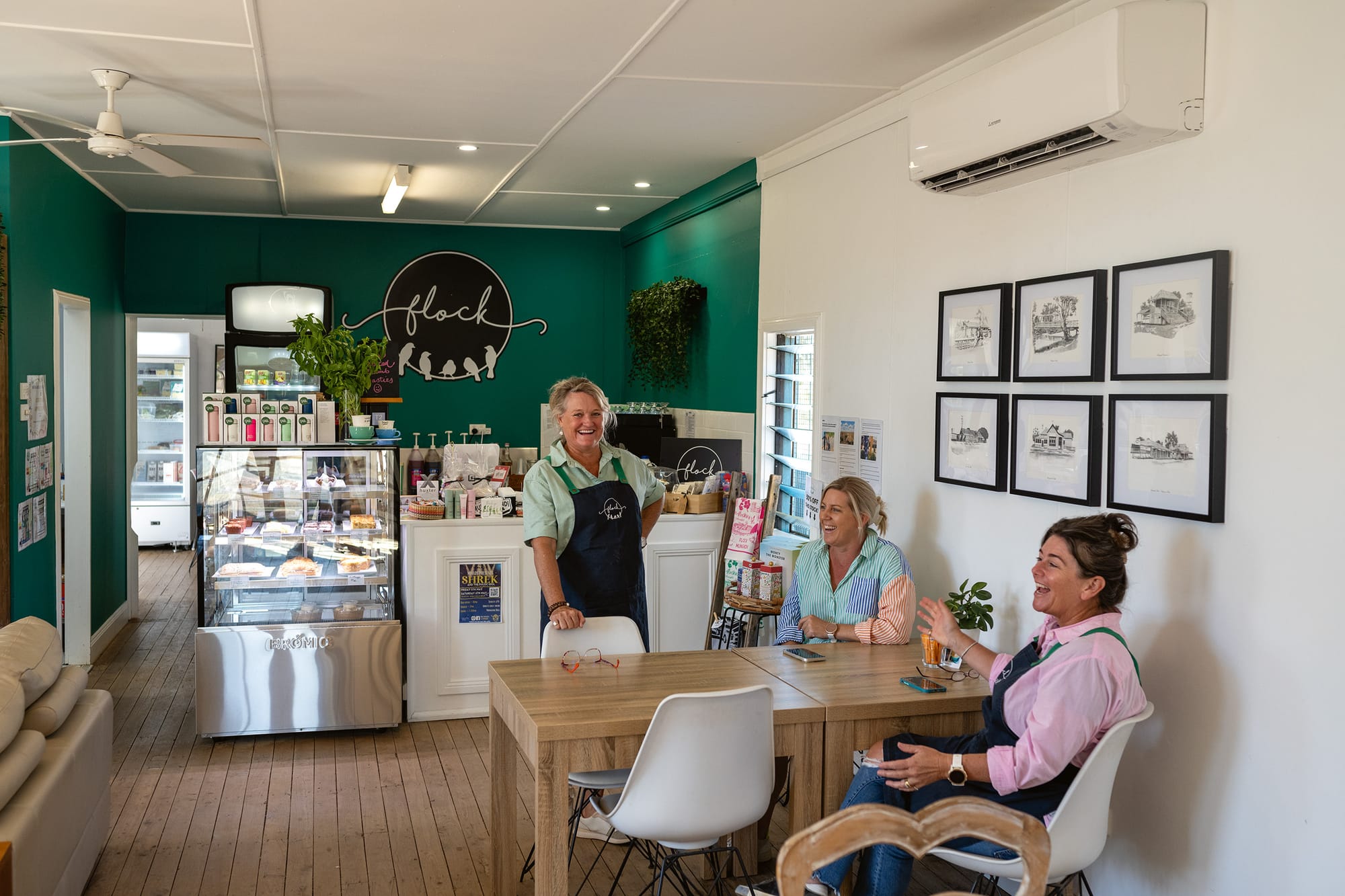
Harris was one of these women. “We mainly wanted to do something positive for the town,” she told Galah in 2021, just after Flock opened. “We’ve lost a lot of people lately and we wanted to give everybody a sense of confidence and show that here are five families in it for the long haul. We’re staying in town. This is where we live. We believe enough in the town that we’ll put our money where our mouth is.”
And it’s not just money. It’s their time, too. It’s the choice to stay up until midnight to pay wages and bills for their farming business and then wake at dawn to bake a cake for Flock or to be the “bacon bitch” on the Flock grill on Saturday mornings. It’s a different type of commitment than writing a cheque. Cheques might pay for buildings, but time builds relationships. Relationships build social capital. And social capital builds strong communities.
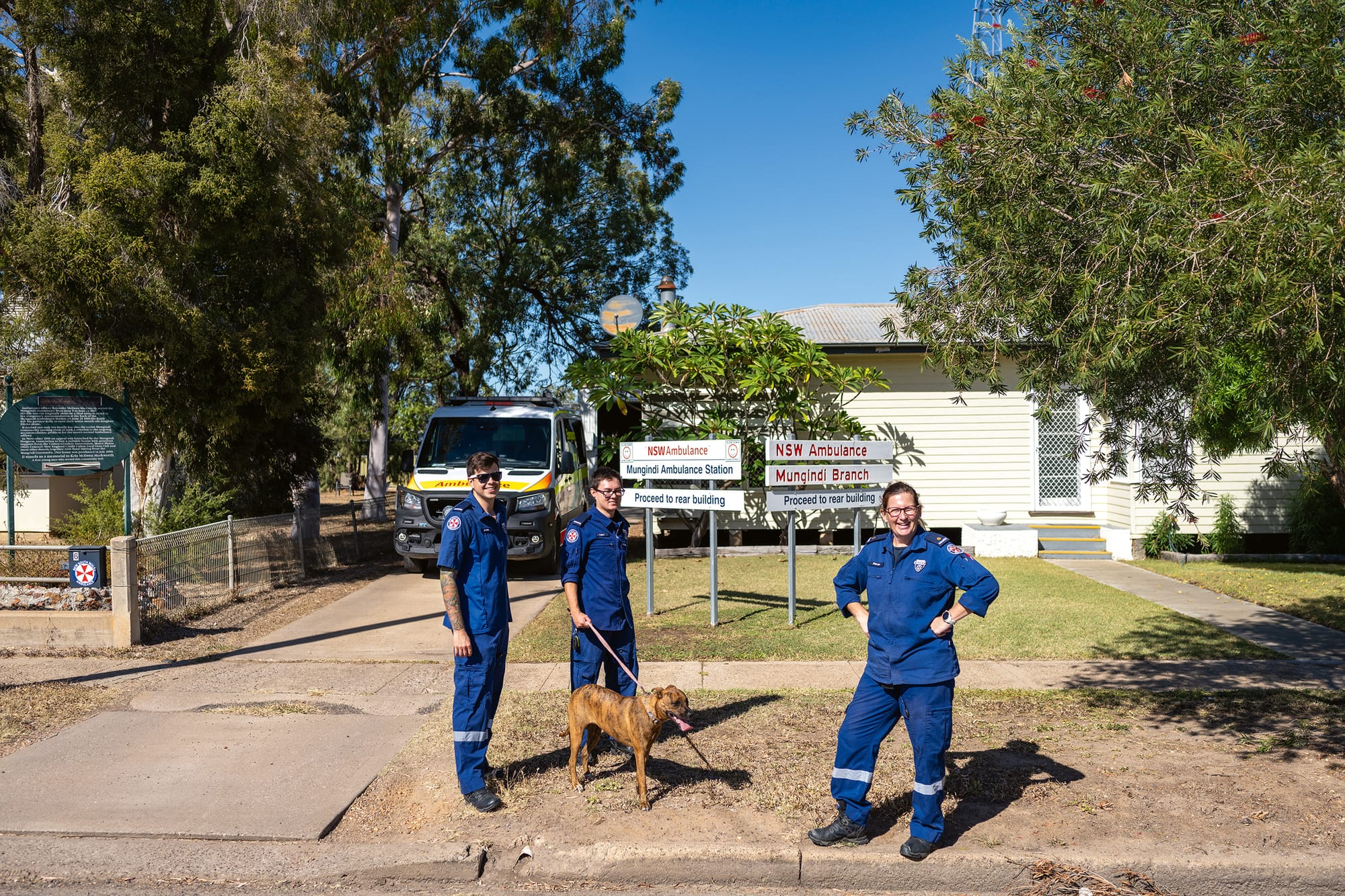
Karen Taylor is a paramedic who moved from Port Macquarie to Mungindi four years ago. She thought she’d be in and out quickly, spending only enough time to “get her points” and move on somewhere else. “But we came out, fell in love with it, bought a little country house that we’re doing up and I’ve got no plans of going anywhere. My kids are at the local school. My husband works at B&W (the ag supply store) … My son’s autistic, everyone knows him. We feel like we’re a part of something.
“Port Macquarie was lovely, all the beaches were pretty, but you can be in a big community and still not feel attached to it. Here you get to know everyone. You know where people live, you know what people are doing. You feel more connected to the community.”
Taylor works closely with two young ambulance officers, Taka Church and Jacob O’Rance, stationed in town. It used to be a single-ambo town until a tragic event in 1999: ambulance officer Kristofer McEwen Markworth had just arrived in town when he had a serious asthma attack. He called 000 but he couldn’t speak clearly enough to say that he was the one who needed help. Dispatch kept calling him to respond to the 000 call.
“Finally someone clicked and sent police around here,” says Taylor, “and they discovered him, passed away. So the community bought this house to permanently lease to the ambulance to make sure we could station more than one ambulance officer out here. And ever since we make sure that there’s at least two officers out here on duty all the time.”
O’Rance says the biggest difference between being an ambulance officer in Mungindi and a big city is anonymity. “You don’t have any. People will come to your door, people will call your personal mobile.”
Taylor adds: “It feels good because you know you’re there when they need you. But it also means there isn’t much downtime. Somebody bumped into Jacob down the supermarket the other day and they made him follow them home to then take them to the hospital.”
Taylor enthusiastically signed up for the musical. She also pushed her colleagues, who weren’t initially as keen, to run the lighting and sound box for the show. “Even though I was on committees before, this has opened up a whole new world of people. And it’s nice to see people now in a different way. You don’t have to identify them through their jobs alone. “Although it takes up a lot of our time, we all come to every single rehearsal because no one wants to let Emily down. She’s won everyone over to the point that they’ll be there, whether they’ve been riding a pig or not.”
Riding a pig? “One of the Three Little Pigs rode a big pig one night, for fun. He ended up with a lacerated liver. We all thought he had a spinal fracture, but thank god he came through, better than anyone deserves to come through that. He rocked up to rehearsal last week with his hospital tags still on – he wasn’t missing out.”
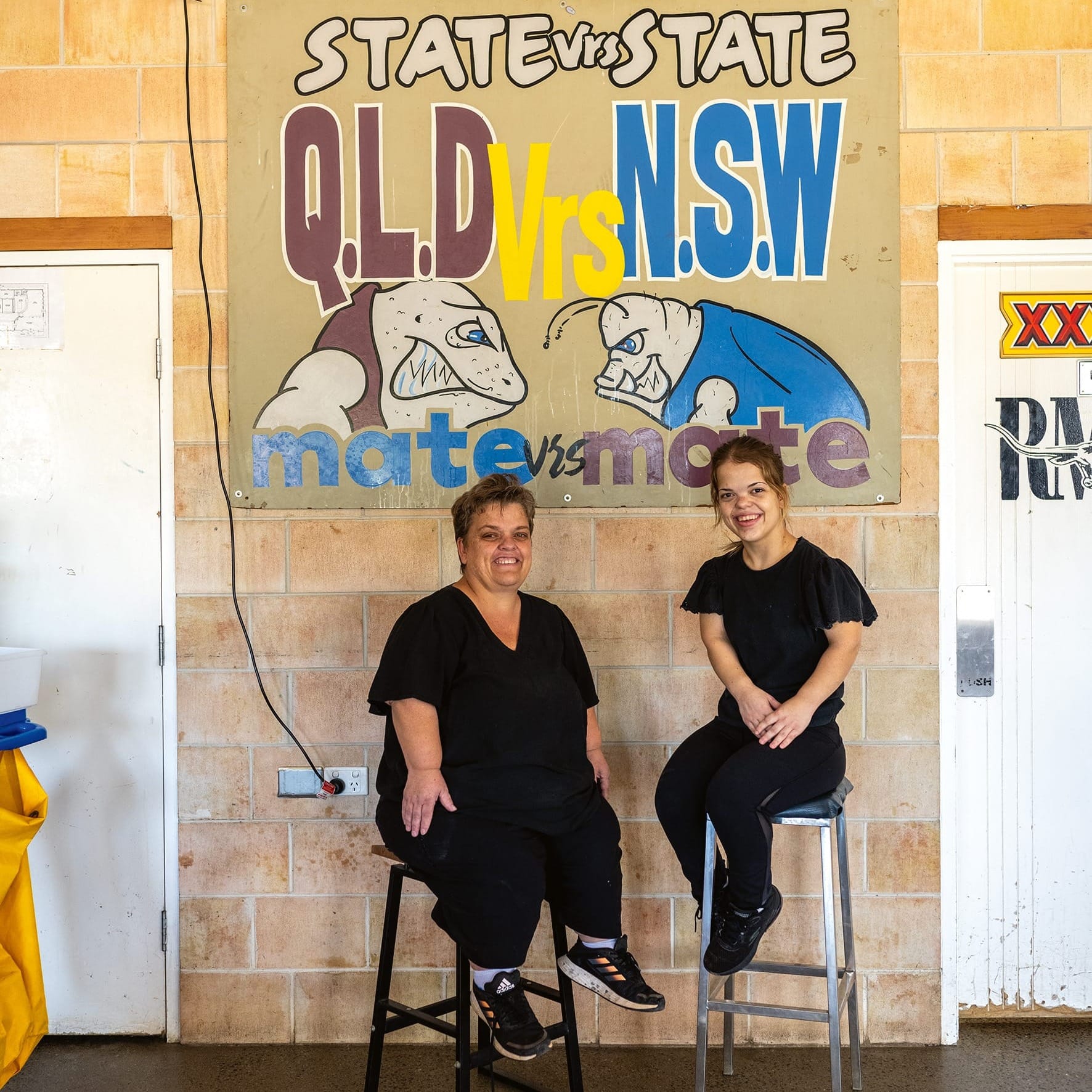
Four years ago Roulé Henning, her younger brother and her parents moved from a farming area in South Africa to Mungindi on a skills shortage visa (her father is a plumber). She was 16, didn’t speak English, didn’t know a soul. But Roulé and her family saw Mungindi as an opportunity. They didn’t feel safe at their home in Wesselsbron, and her parents wanted better opportunities for their children. Roulé worked hard to learn English and complete year 12. Now she is studying nursing by correspondence. Her brother is on his way to getting his auto-mechanic qualification.
Their mother Yolanda is proud. “I want my kids to do something with their lives,” she says at the Two Mile, where she works as a cleaner with her daughter.
Roulé, now 20, shines in the musical as Snow White. She’s up there front and centre, singing and dancing to songs including Price Tag and Right Back Where We Started From, owning the stage and her small stature.
“When I was in school I wasn’t so outgoing,” she says. “But after I met Emily and started going [to the musical] I was building more confidence. I’m having fun up there pretending to be Snow White.”

Britt Bate is a high school teacher at Mungindi. She lives over the border in St George, about an hour’s drive away, where she also works as a youth pastor. She came to St George from the Gold Coast for teacher training. Coincidentally, her pastor from the Gold Coast said he was going to send her out on a mission to St George. “It was incredible timing,” says Bate.
On top of both of these roles, she has become a legal guardian to a teenage girl she met through her youth pastoring. “She’s 15. I am 30. She’s got one parent in jail. The other is deemed unfit to raise her. So she needed someone to care for her.”
Bate has chiselled out time to be part of the musical. She plays one of the dancing Swamp Sisters troupe, Snow White’s supporting posse. She loves dancing and created most of the choreography for the show. Her teenage charge comes to the bi-weekly practices with her, then they drive back to St George. “She thinks the play is pretty funny,” says Bate.
“Because my life is just full – which is terrible to say – I don’t have the opportunity to go to the pub, I just don’t have time or the energy. So [the musical] has been a kind route for me to do that, but do it knowing it’s productive and knowing it’s actually valuable.”

Peter is a Prince. He’s part of Mungindi’s Prince family, an “iconic” local Indigenous family known for their strong women and sporting prowess. But in the musical he plays the King. Dressed in the royal garb of a red cape and crown, the 25-year-old opens the show with a Welcome to Country. An Indigenous man playing an English king welcoming the rowdy audience in the packed-out hall feels very Mungindi.
Prince is a teacher at Mungindi Central, where he went to school until a few years ago. It’s his first year as a teacher and he’s in charge of a composite class of years 3, 4, 5 and 6. His nephew, niece and two of his cousins are students in his class. “It’s definitely weird because it’s not ‘Uncle’ at school. It’s Mr Prince.”
When asked about how it feels, the blurring of roles in small towns, where you can be uncle, teacher, king, all in one, he gently replies: “But this what I know. Wherever you can, you do your part.”
So what kind of an impact does an amateur musical have on a town? Two performances attracted 560 audience members (more than the town’s population) to Mungindi’s town hall. There were 80-plus hours of rehearsals, a WhatsApp chat group with hundreds of messages, one – possibly two – motivational speeches about summiting Everest, and one lacerated liver.
Most importantly, the 42 people in the cast and crew have built between them 861 relationships. (Remember the high-school maths formula to work out how many pairs there are in a group? To save you googling, here it is: n x (n – 1) / 2.) And so now, when the next fire comes or the next flood cuts off the town, there are 861 friendships that are strong and ready to share the load. And when the next wedding happens, or graduation or birth, they’ll all be there to share the joy.
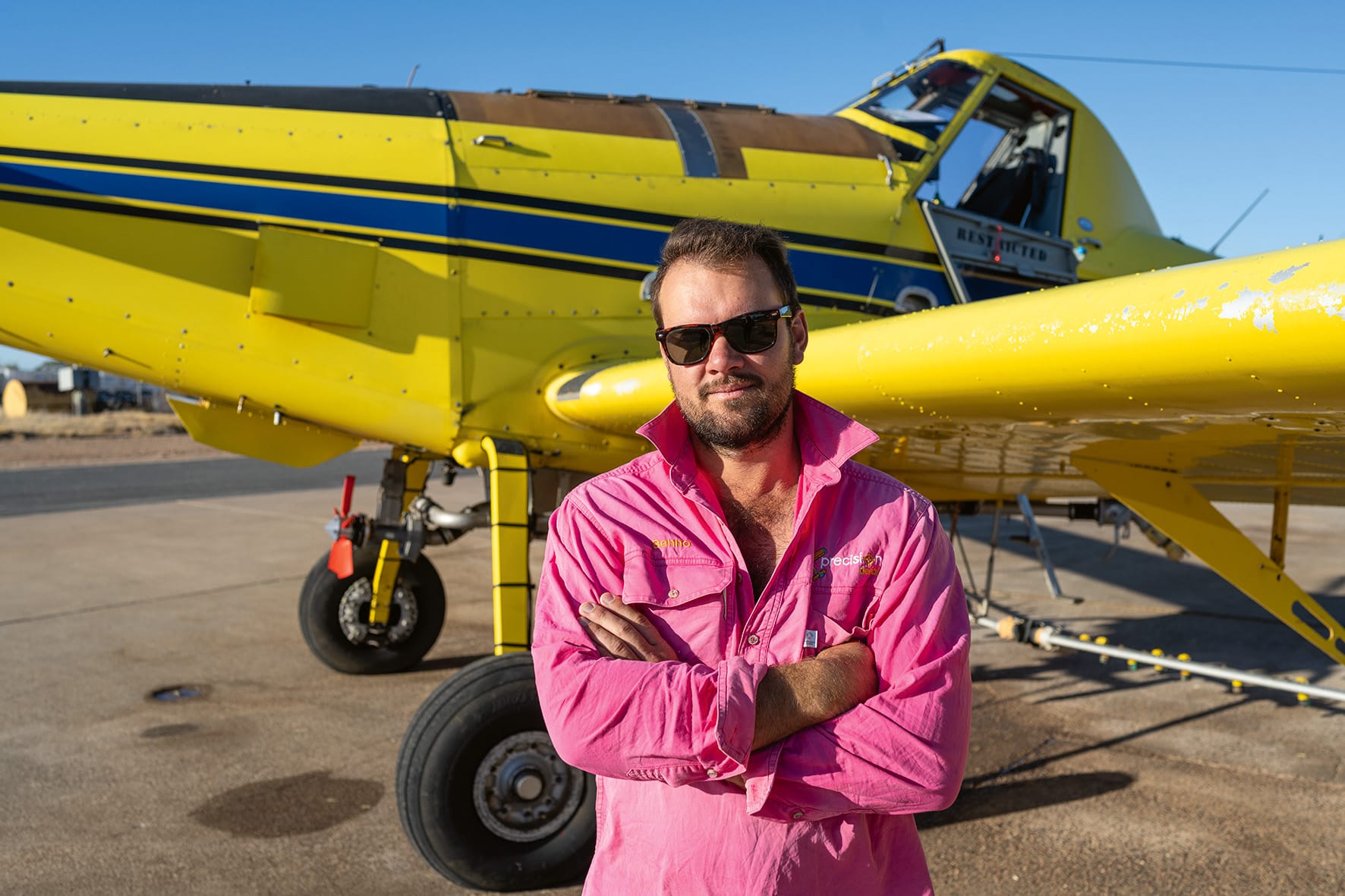
Ben Lewty is the Shrek stage manager and a pilot who moved from Ayr to Mungindi for work, where he can spend 14 hours a day aerial spraying. He says it is these relationships that motivate him to stay in town. “Mungindi is very contagious – the people in it. If you just drove through you’d go ‘ho-ly, do people even exist?’ But when you get involved and get to know a few people, it’s a really good community.”
How bigger regional towns replicate the Mungindi method of social cohesion is the next question. The bigger a town, the more stratification there is. The less “brushing up” against each other there is.
Mungindi shows us how a musical can create social capital at the community level and how that has the power to trickle up and positively affect life in a town. Perhaps the first step to recreate the Mungindi Shrek Effect is to see the real joy and benefits that can come from hanging out with people who are different from us. “If you want to build a ship,” wrote Antoine de Saint-Exupéry, “don’t drum up the men to gather wood, divide the work, and give orders. Instead, teach them to yearn for the vast and endless sea.” Maybe Mungindi can teach us to yearn for more for our communities and our relationships in them.
